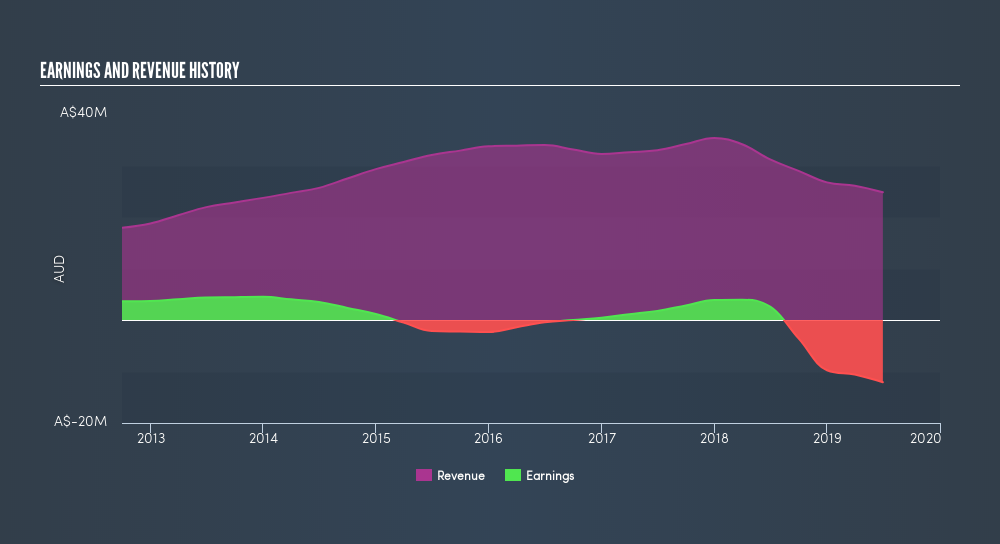- Australia
- /
- Professional Services
- /
- ASX:EAX
How Does Investing In Energy Action Limited (ASX:EAX) Impact The Volatility Of Your Portfolio?

Anyone researching Energy Action Limited (ASX:EAX) might want to consider the historical volatility of the share price. Modern finance theory considers volatility to be a measure of risk, and there are two main types of price volatility. The first category is company specific volatility. This can be dealt with by limiting your exposure to any particular stock. The other type, which cannot be diversified away, is the volatility of the entire market. Every stock in the market is exposed to this volatility, which is linked to the fact that stocks prices are correlated in an efficient market.
Some stocks see their prices move in concert with the market. Others tend towards stronger, gentler or unrelated price movements. Beta can be a useful tool to understand how much a stock is influenced by market risk (volatility). However, Warren Buffett said 'volatility is far from synonymous with risk' in his 2014 letter to investors. So, while useful, beta is not the only metric to consider. To use beta as an investor, you must first understand that the overall market has a beta of one. A stock with a beta greater than one is more sensitive to broader market movements than a stock with a beta of less than one.
See our latest analysis for Energy Action
What EAX's beta value tells investors
Zooming in on Energy Action, we see it has a five year beta of 0.85. This is below 1, so historically its share price has been rather independent from the market. This means that -- if history is a guide -- buying the stock would reduce the impact of overall market volatility in many portfolios (depending on the beta of the portfolio, of course). Many would argue that beta is useful in position sizing, but fundamental metrics such as revenue and earnings are more important overall. You can see Energy Action's revenue and earnings in the image below.

Does EAX's size influence the expected beta?
With a market capitalisation of AU$7.3m, Energy Action is a very small company by global standards. It is quite likely to be unknown to most investors. Companies with market capitalisations around this size often show poor correlation with the broader market because market volatility is overshadowed by company specific events, or other factors. It's worth checking to see how often shares are traded, because very small companies with very low beta values are often only thinly traded.
What this means for you:
Since Energy Action is not heavily influenced by market moves, its share price is probably far more dependend on company specific developments. It could pay to take a closer look at metrics such as revenue growth, earnings growth, and debt. In order to fully understand whether EAX is a good investment for you, we also need to consider important company-specific fundamentals such as Energy Action’s financial health and performance track record. I highly recommend you dive deeper by considering the following:
- Future Outlook: What are well-informed industry analysts predicting for EAX’s future growth? Take a look at our free research report of analyst consensus for EAX’s outlook.
- Past Track Record: Has EAX been consistently performing well irrespective of the ups and downs in the market? Go into more detail in the past performance analysis and take a look at the free visual representations of EAX's historicals for more clarity.
- Other Interesting Stocks: It's worth checking to see how EAX measures up against other companies on valuation. You could start with this free list of prospective options.
We aim to bring you long-term focused research analysis driven by fundamental data. Note that our analysis may not factor in the latest price-sensitive company announcements or qualitative material.
If you spot an error that warrants correction, please contact the editor at editorial-team@simplywallst.com. This article by Simply Wall St is general in nature. It does not constitute a recommendation to buy or sell any stock, and does not take account of your objectives, or your financial situation. Simply Wall St has no position in the stocks mentioned. Thank you for reading.
About ASX:EAX
Energy Action
An independent energy partner, provides electricity and gas procurement services, energy management, and retail billing services to business customers in Australia.
Excellent balance sheet and good value.
Market Insights
Community Narratives





